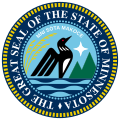| |||||||||||||||||||||
| |||||||||||||||||||||
| |||||||||||||||||||||
| Elections in Minnesota |
|---|
 |
The 1894 Minnesota lieutenant gubernatorial election was held on November 6, 1894, in order to elect the lieutenant governor of Minnesota. Republican nominee and incumbent lieutenant governor David Marston Clough defeated People's nominee Edwin E. Lommen, Democratic nominee John Ludwig and Prohibition nominee Charles M. Way. [1]

